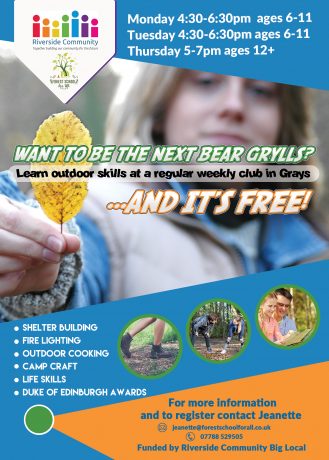
Category Archives: Uncategorised
Eden Project Community Camp
Forest School for All has been invited to attend a community camp in May. An exciting opportunity to meet like minded people, gain support for new local projects and to spend time at the amazing Eden site.
Outdoor Learning: Forest School Approach
In the wake of the National Trust’s recent report highlighting the decline in outdoor play in the UK I thought I’d provide a quick overview of the forest school approach as I feel it could help to reconnect children with the natural world.
What is the Forest School approach?
The Forest school ethos developed in Sweden in the 1950s but it is becoming increasingly popular here in the UK. It’s an approach that takes a long term sustained approach to outdoor learning. Forest schools seek to encourage, motivate, engage and inspire children through positive outdoor experiences.Forest schools are closely entwined with the concepts of free flow play and learning from play. The importance of play has been surmised in a handbook produced by Futurelab.org.uk:
“Play is a crucial element in supporting children’s health, development and well-being and a means through which they experiment, develop their abilities, get creative and explore the world around them. Effective play enables children to explore and create rules and understandings; develop resilience; be active; be creative and imaginative; practice new skills; learn about risks; stimulate their senses and build friendships and relationships. Play can contribute immensely to children’s enjoyment of childhood, offering a place of sanctuary and also providing a therapeutic function by helping them to deal with emotional circumstances and issues that can occur in their lives.”
The forest school approach demands that the outside space is not seen as merely a place where children go to burn off energy. The divide between indoors and outdoors is broken and children learn in and from nature. They are given freedom to direct their own learning and enter in to a certain amount of ‘risky-play’. This in turn increases their sense of engagement and motivation. The rich variety of activities on offer and the sense of independence can have very positive effects on a child’s intellectual, cognitive, physical and emotional development. It can help to build a child’s self-esteem and confidence whilst also providing a springboard for numerous academic pursuits touching upon every area of learning.
It should be pointed out that the forest school approach need not be restricted to settings with access to vast outdoor spaces and woodland. It is an ethos that can be adopted even with limited space: “In school settings where land is not available, or funds do not allow, the school might take advantage of the local community’s existing neighbourhood resources such as parks, public space, walking tours, and community and business establishments.”
Outdoor learning activities
The natural world offers so many opportunities for learning. Here are a few specific outdoor learning activity ideas linked to the Forest School approach. Many of these ideas could also work well in settings with limited access to outdoor spaces.
– Cook on an open fire
– Create a woodland nest for a bird
– Create dens, shelters, bridges and sculptures
– Collect colours from nature
– Mark making exercises using natural materials
– Create a woodland assault course for a squirrel
– Hunt for minibeasts in trees, bushes, deadwood etc
– Create a bug hotel
– Plant trees, lay hedges, maintain ponds
– Climb trees
– Build fires
– Listen to the heartbeat of trees (sap-rising)
– Examine the shape, scent, sound and surface of various trees
A day in the life of a Forest School
“Children come into the woodland at least one half day each week. At other times, they make environmental art or watch bluetits raising chicks in the nest bow using CCTV. They play music on simple homemade environmental instruments. Throughout, they develop their skills of teamwork and cooperation, listening and observation. A typical start to the day involves a listening task. Children sit quietly with closed eyes and listen to the sounds of nature. One child has learnt to distinguish the calls of the cock and hen blackbird.
Being outdoors offers opportunities for doing things in different ways and on a different scale. Children create art work from leaves, twigs, stones and mud and in the autumn colour the mud with blackberry juice. From pre-school onwards to primary school, they learn to use tools, starting with a potato peeler to peel bark from twigs and create a point, through to using knives and saws for progressively demanding challenges.
Through my work with Forest School for All I have identified the benefits of outdoor learning as being those of, increased self-esteem; improved social skills; development of language and communication skills; improved physical motor skills; improved motivation and concentration; and increased knowledge and understanding of the environment… The outdoor activities link with those indoors, such as art, reading, literacy and early numeracy.
New youth club looking for the next Bear Grylls
NEW YOUTH CLUB LOOKING FOR THE NEXT BEAR GRYLLS
 Grays Riverside Big Local are launching an exciting new outdoor skills project for the young people of Grays Riverside in partnership with Forest School for All.
Grays Riverside Big Local are launching an exciting new outdoor skills project for the young people of Grays Riverside in partnership with Forest School for All.
The weekly activities are for youngsters aged 8-19 who want to learn forest skills such as shelter building, fire lighting, outdoor cooking, camp craft and new life skills and will be on different weeknights for three age ranges.
The group are also looking for adult volunteers who would like to receive training and be involved. Organiser, Jeanette Alexander said “I often see young people transformed when they are learning practical skills outdoors, so many don’t get the regular opportunity to do these kinds of activities in a safe environment.”
To register your interest in joining one of the groups fill in the form below or as a volunteer please apply here or call Jeanette on 07788 529505
Birthday Party Age 8 this weekend
Warning: Trying to access array offset on value of type null in /home2/forestsch/public_html/wp-content/plugins/fusion-core/shortcodes/class-columns.php on line 64
Warning: Trying to access array offset on value of type null in /home2/forestsch/public_html/wp-content/plugins/fusion-core/shortcodes/class-columns.php on line 64
Warning: Trying to access array offset on value of type null in /home2/forestsch/public_html/wp-content/plugins/fusion-core/shortcodes/class-columns.php on line 65
Warning: Trying to access array offset on value of type null in /home2/forestsch/public_html/wp-content/plugins/fusion-core/shortcodes/class-columns.php on line 65
Warning: Trying to access array offset on value of type null in /home2/forestsch/public_html/wp-content/plugins/fusion-core/shortcodes/class-columns.php on line 88
Warning: Trying to access array offset on value of type null in /home2/forestsch/public_html/wp-content/plugins/fusion-core/shortcodes/class-columns.php on line 88
Warning: Trying to access array offset on value of type null in /home2/forestsch/public_html/wp-content/plugins/fusion-core/shortcodes/class-columns.php on line 92
